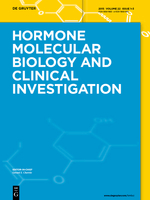
JOURNAL OF MOLECULAR ENDOCRINOLOGY
Scope & Guideline
Pioneering Insights into Hormonal Regulation
Introduction
Aims and Scopes
- Endocrine Physiology and Pathophysiology:
The journal publishes studies that explore the physiological roles of hormones and their impact on health and disease, including diabetes, obesity, and metabolic syndromes. - Molecular Mechanisms of Hormonal Action:
Research detailing the molecular pathways and mechanisms through which hormones exert their effects, including receptor signaling, gene expression regulation, and post-translational modifications. - Developmental and Reproductive Biology:
Focus on hormonal influences during development and reproduction, including studies on fertility, pregnancy, and developmental disorders associated with endocrine dysfunction. - Metabolic Regulation:
Exploration of how hormones regulate energy metabolism, homeostasis, and the adaptive responses of tissues to metabolic challenges. - Innovative Therapeutic Approaches:
The journal highlights novel therapeutic strategies targeting hormonal pathways, including drug development and the use of biologics in treating endocrine disorders.
Trending and Emerging
- Integration of Omics Technologies:
There is an increasing trend towards utilizing genomics, proteomics, and metabolomics to uncover the complex interactions of hormones at various biological levels, providing a holistic view of endocrine functions. - Focus on Circadian Rhythms in Endocrinology:
Research investigating the relationship between circadian rhythms and hormonal regulation has gained momentum, emphasizing the impact of timing on metabolic processes and hormone secretion. - Role of Microbiome in Endocrine Health:
Emerging studies are exploring the influence of the gut microbiome on endocrine function and metabolic health, highlighting the interconnectedness of microbiota and hormonal regulation. - Personalized and Precision Endocrinology:
There is a growing emphasis on personalized approaches to endocrine disorders, tailoring treatments based on individual genetic and metabolic profiles, which reflects a broader trend in medicine. - Impact of Environmental Endocrine Disruptors:
Research on how environmental factors, including endocrine disruptors, affect hormonal systems is increasingly prominent, reflecting public health concerns and regulatory interests.
Declining or Waning
- Traditional Hormone Replacement Therapies:
Research focused solely on conventional hormone replacement therapies has decreased, possibly due to growing interest in personalized medicine and alternative therapeutic strategies. - Static Models of Endocrine Dysfunction:
There is a waning interest in studies using static or non-physiological models for endocrine dysfunction, as more researchers are leaning towards dynamic systems that better mimic in vivo conditions. - Generalized Mechanistic Studies:
Broad mechanistic studies without specific clinical applications have become less common, as the journal increasingly favors research with direct implications for treatment or understanding specific diseases. - Historical Perspectives on Endocrinology:
Papers centered on historical reviews or perspectives in endocrinology have seen a decline, with a shift towards more contemporary and cutting-edge research.
Similar Journals

JOURNAL OF STEROID BIOCHEMISTRY AND MOLECULAR BIOLOGY
Pioneering Research in Molecular Biology and EndocrinologyJOURNAL OF STEROID BIOCHEMISTRY AND MOLECULAR BIOLOGY is a distinguished peer-reviewed journal published by Pergamon-Elsevier Science Ltd, committed to advancing the fields of biochemistry, molecular biology, and endocrinology. With an ISSN of 0960-0760 and an E-ISSN of 1879-1220, this journal has garnered a notable reputation, securing a Q2 ranking in numerous categories, including Biochemistry, Cell Biology, and Clinical Biochemistry, as of 2023. Hailing from the United Kingdom, it serves as a critical platform for the dissemination of impactful research from 1990 to 2025 and beyond. Although it does not currently offer open access options, the journal's comprehensive coverage and rigorous peer review process ensure high-quality publications that significantly contribute to the understanding of steroid biochemistry and related fields. Targeting a diverse audience of researchers, professionals, and students, the journal remains an essential resource for those seeking to stay at the forefront of scientific innovation and discovery.

Hormone Molecular Biology and Clinical Investigation
Pioneering Research in Molecular Biology and Clinical PracticeHormone Molecular Biology and Clinical Investigation, published by WALTER DE GRUYTER GMBH, is a pivotal journal within the realms of Endocrinology, Diabetes and Metabolism, and Molecular Biology, contributing significant insights to the field since its inception in 2010. With an ISSN of 1868-1883 and an E-ISSN of 1868-1891, this esteemed journal operates from its headquarters in Berlin, Germany. As a further testament to its growing influence, the journal has achieved respectable category quartile rankings in 2023, including Q3 in Endocrinology, Diabetes and Metabolism and Medicine (miscellaneous), alongside Q4 in Molecular Biology. While currently not open access, the journal is dedicated to disseminating high-quality research aimed at understanding hormone-related mechanisms, clinical applications, and the biochemical pathways that underpin human health. The rich variety of articles published in Hormone Molecular Biology and Clinical Investigation make it an invaluable resource for researchers, medical professionals, and students seeking to deepen their knowledge in these critical scientific areas.

HORMONE AND METABOLIC RESEARCH
Unraveling the Complexities of Hormonal InfluenceHORMONE AND METABOLIC RESEARCH, published by GEORG THIEME VERLAG KG, stands as a reputable platform in the fields of biochemistry, endocrinology, and metabolism since its establishment in 1969. This peer-reviewed journal provides critical insights and advancements in the intricate relationships between hormones and metabolic processes, catering to researchers, healthcare professionals, and students alike. With an impressive convergence of knowledge spanning over five decades, it maintains a commendable Q3 ranking in multiple categories, including Biochemistry, Clinical Biochemistry, and Endocrinology, highlighting its contribution to cutting-edge scientific discourse. Although not an open-access journal, it offers a plethora of access options for readers and institutions, ensuring that vital research reaches those who need it most. Located in Stuttgart, Germany, the journal is positioned at the forefront of influential research in hormone and metabolic studies, emphasizing its importance for ongoing investigations into health and disease.

Frontiers in Endocrinology
Empowering Science Through Open Access in EndocrinologyFrontiers in Endocrinology, published by FRONTIERS MEDIA SA, is a leading open-access journal dedicated to the advancement of research in the fields of endocrinology, diabetes, and metabolism. Established in 2010, this journal has consistently demonstrated its academic excellence, achieving a prominent Q1 quartile ranking in its category as of 2023, and a commendable Scopus rank of #96 out of 244, placing it within the 60th percentile. The journal is committed to disseminating high-quality research that encompasses a wide range of topics within endocrinology, catering to the needs of a diverse audience that includes researchers, medical professionals, and students alike. With the critical goal of fostering knowledge-sharing and collaboration within the scientific community, Frontiers in Endocrinology is an invaluable resource for anyone looking to stay updated on the latest advancements and insights in endocrinology. It operates under a robust open-access model, ensuring that groundbreaking research is accessible to all, thereby driving innovation and progress in this essential field.

BEST PRACTICE & RESEARCH CLINICAL ENDOCRINOLOGY & METABOLISM
Fostering excellence in clinical research and patient care.BEST PRACTICE & RESEARCH CLINICAL ENDOCRINOLOGY & METABOLISM is a leading academic journal published by Elsevier that focuses on the dynamic field of endocrinology and metabolism. With an impressive impact factor reflected in its Q1 ranking in both endocrinology and endocrinology, diabetes, and metabolism for 2023, this journal is essential for researchers, healthcare professionals, and students seeking to stay abreast of the most significant developments in clinical practice and research. Covering a wide range of topics within the scope of endocrinology, the journal provides a platform for innovative research, comprehensive reviews, and insightful case studies, all aimed at enhancing patient care and advancing the field. With robust rankings, including a position of 22nd out of 244 in Endocrinology and a 90th percentile ranking in Biochemistry, Genetics, and Molecular Biology, this journal is recognized for its scholarly contribution and relevance. As an open-access journal, it ensures that valuable research is accessible to a global audience, advancing knowledge and clinical practice in endocrinology.

AMERICAN JOURNAL OF PHYSIOLOGY-ENDOCRINOLOGY AND METABOLISM
Transforming understanding in endocrinology and metabolism.American Journal of Physiology-Endocrinology and Metabolism, published by the American Physiological Society, stands as a leading platform for disseminating high-quality research in the fields of endocrinology, diabetes, and metabolism, as well as general physiology. With an impressive impact factor placing it within the Q1 category across multiple relevant disciplines (Endocrinology, Diabetes and Metabolism; Physiology; and Medical Physiology), this journal reflects its authoritative position in the scientific community. Spanning from 1980 to 2024, the journal consistently publishes groundbreaking studies and significant findings that advance our understanding of hormonal regulation and metabolic processes. Although it does not currently offer open access, it provides valuable resources for researchers, professionals, and students alike, eager to stay at the forefront of advancements in physiological sciences. Addressed in Rockville, Maryland, its commitment to excellence and rigorous peer review ensures that every article contributes essential insights to the field.

ENDOCRINE RESEARCH
Pioneering discoveries in endocrine health.ENDOCRINE RESEARCH is a prominent peer-reviewed journal published by TAYLOR & FRANCIS INC, focused on the dynamic field of endocrinology. With an ISSN of 0743-5800 and an E-ISSN of 1532-4206, this journal has been contributing to the scientific community since 1974, providing a platform for researchers to disseminate innovative findings related to hormonal research and its implications in diverse medical contexts. Operating from the United States, it falls within the Q3 quartile ranking in both Endocrinology and Medicine (Miscellaneous), reflecting its recognized impact within these disciplines. While ENDOCRINE RESEARCH currently does not offer open access options, it remains an invaluable resource for professionals, students, and researchers seeking to stay at the forefront of endocrine science and clinical application. The journal invites original research articles, reviews, and case studies, fostering a collaborative environment for discussing the complexities of endocrinological phenomena.

GENERAL AND COMPARATIVE ENDOCRINOLOGY
Pioneering insights into the endocrine landscape since 1961.GENERAL AND COMPARATIVE ENDOCRINOLOGY, published by Academic Press Inc Elsevier Science, is a distinguished journal that has been at the forefront of endocrine research since its inception in 1961. With an ISSN of 0016-6480 and an E-ISSN of 1095-6840, this journal caters to a diverse audience, including researchers, professionals, and students in the fields of animal science, zoology, and endocrinology. It holds a prestigious Q1 ranking in Animal Science and Zoology and is recognized in the Q3 quartile for Endocrinology, indicating its significant contribution to advancing scientific knowledge. The journal is also well-regarded within the Scopus rankings, with impressive placements in multiple categories, highlighting its impact and relevance in the academic community. By focusing on comparative analyses and fostering a deeper understanding of hormone function and regulation across species, GENERAL AND COMPARATIVE ENDOCRINOLOGY aims to bridge gaps in knowledge and stimulate innovative research paradigms. While it does not currently offer Open Access, the journal remains committed to high-quality peer-reviewed content, making it an essential resource for anyone engaged in this vital field of study.

Hormones-International Journal of Endocrinology and Metabolism
Connecting Scholars in the Realm of Hormonal StudiesHormones - International Journal of Endocrinology and Metabolism, published by Springer International Publishing AG, is a vital resource within the field of Endocrinology, Diabetes, and Metabolism. Since its inception in 2005, this journal has made significant contributions to the understanding of hormonal mechanisms and their implications across various medical disciplines. With a current impact factor that places it in the Q3 category for Endocrinology and the Q2 category for miscellaneous Medicine – as indicated by its Scopus rankings – it stands out as a reputable platform for cutting-edge research and clinical findings. Although it operates under a subscription model, the journal's comprehensive scope encompasses basic and applied scientific studies, making it essential reading for researchers, clinicians, and students alike. The journal is headquartered in Germany with a strong commitment to promoting scholarly communication and knowledge dissemination within its specialized fields through the year 2024 and beyond.

DOMESTIC ANIMAL ENDOCRINOLOGY
Advancing the Science of Animal HormonesDOMESTIC ANIMAL ENDOCRINOLOGY, published by Elsevier Science Inc., is a leading academic journal dedicated to advancing the field of endocrinology as it pertains to domestic animals. With an ISSN of 0739-7240 and an E-ISSN of 1879-0054, this journal serves a crucial role in disseminating high-quality research and insights that bridge veterinary science and animal physiology. The journal is recognized for its impactful contributions, boasting an impressive Q1 ranking in Animal Science and Zoology, further solidified by its prominent positioning in related fields such as Veterinary Science and Food Animals. Covering research from 1984 to 2025, DOMESTIC ANIMAL ENDOCRINOLOGY is an essential resource for researchers, professionals, and students seeking to deepen their understanding of hormonal functions and their implications in animal health and production. Despite not being an Open Access publication, it provides vital access options for institutions and individuals, ensuring that groundbreaking studies reach practitioners and scholars alike.